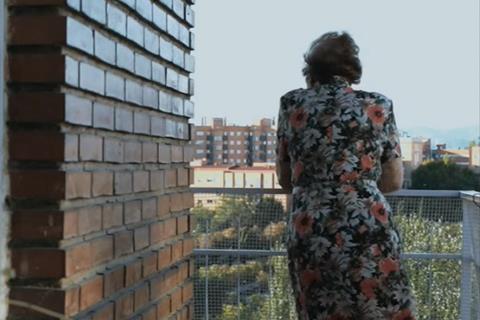Life passes slowly for the director’s grandparents, and a turbulent past still lingers in this award-winning documentary from Spain

Dir/scr: Alejandro Vazquez San Miguel. Spain. 2022. 145 mins
Old age is marked by frailty, weariness and the tug of troubling memories in A Landscaped Area Too Quiet For Me. Director Alejandro Vazquez San Miguel’s desire to spend more time with his elderly Spanish grandparents results in a lengthy documentary that observes their daily lives in granular detail before allowing his grandmother the chance to recount the story of her life. Unfolding with respect and affection, it is a first feature that addresses the past and resonates with the present. There should be modest festival interest in a title that won the YouTube International Competition Jury Award at DocLisboa.
San Miguel’s formidable grandmother Choncita is in her early 90s when we first see her in 2018. A few years earlier, she was thought to be on the brink of death but rallied, much to the surprise of the medical profession. Now, San Miguel is using that extra time they have together to tell her story.
We are only too ready to listen
Choncita and her husband Jandri now live in a suburban apartment assisted by one-woman cook, cleaner and carer Carmen. Choncita had lived in Madrid since 1952 and misses the views and the bustle of life on the streets. It is her disdain for the landscape beneath her lofty balcony that gives the film its title. The couple’s world has shrunk to more or less what happens within these walls. The preparation of food and meal times are the anchors of their existence. Jandri counts out their daily pills. Choncita always makes herself presentable. They could be the devoted elderly couple in Michael Haneke’s Amour (2012) and San Miguel’s film has similarities with Chantal Akerman’s swansong documentary No Home Movie (2015) on her mother.
San Miguel doesn’t just observe his grandparents in their apartment, he also orchestrates the filming, resetting the stage or sometimes requesting a retake. “I don’t know what you are doing, “ states his grandmother. He also mutes the sound so it is possible to just watch and admire Chonchita. There is a tender intimacy to those moments as we silently gaze on her animated features and the sparkle in her eyes. San Miguel captures the rhythms and tedium of the grandparents lives as Jandri shuffles around the apartment and snoozes or Conchita stands on their balcony, still smoking despite doctors orders. We feel the slowing tick of time as their lives wind down. As images dissolve into each other or fade from view, it feels as if they are already ghosts in their own home.
A great part of the film consists of the footage shot in their apartment but there is just the lightest seasoning of brief excerpts from home movies, black and white photos, films and songs.Choncita is clearly still very engaged in the world and frustrated that it is no longer possible to go places or meet people. It is also clear that she is not at peace. There are unresolved aspects of her life that mean she does not feel any sense of contentment.
Having allowed us into their lives and gained a sense of Choncita’s personality we finally have the chance hear her story. Raised under Franco, she has memories of loss and sacrifice, poverty and hardship. She also carries a sense of disappointment in herself that she may not have been the best mother to a son that has predeceased her. She now writes him poignant letters that will never be read. Choncita also laments what is happening around her, from the treatment of refugees to the modern threats to democracy. What she senses is history repeating.The final forty-five minutes of the film is the most immediate and engaging as the camera remains fixed on Choncita and just allows her to speak about “tragedy after tragedy” . The previous two hours have given us all the context and understanding that we need and we are only too ready to listen.
Production company/international sales: Alejandro Vazquez San Miguel, alexcubamadrid@gmail.com
Producer: Alejandro Vazquez San Miguel
Cinematography: Carlos Cuadrado, Diego Lopez Calcio
nEditing: Marta Velasco, Rocio Gattinoni






![The Brightest SunScreen[Courtesy HKIFF]](https://d1nslcd7m2225b.cloudfront.net/Pictures/274x183/3/5/0/1448350_thebrightestsunscreencourtesyhkiff_312678.jpg)















![The Brightest SunScreen[Courtesy HKIFF]](https://d1nslcd7m2225b.cloudfront.net/Pictures/100x67/3/5/0/1448350_thebrightestsunscreencourtesyhkiff_312678.jpg)


No comments yet